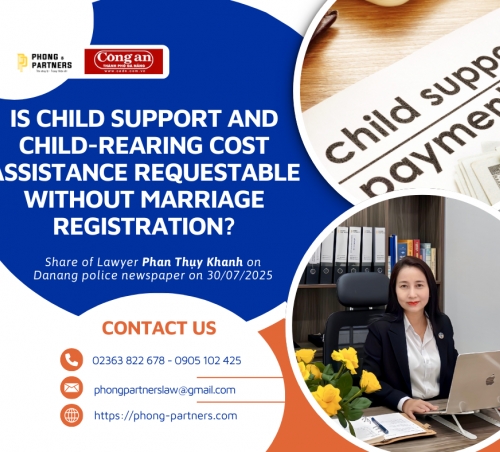*Lawyer Phan Thuy Khanh – Deputy Head of Phong & Partners Law Firm, responds:
Nowadays, public legal awareness has improved significantly. However, many people still remain unclear about their basic rights and obligations in common transactions or in close civil relationships such as marriage and family. To avoid unnecessary disputes, individuals should learn about the legal regulations relevant to the issues they are concerned about. Mr. Quoc may refer to the lawyer’s response below for further guidance.
First, does the parent who does not have direct custody have the right to visit and care for the child after divorce?
According to clause 3, Article 82 of the 2014 Law on Marriage and Family, “after divorce, the non-custodial parent has the right and obligation to visit the child, and no one is allowed to obstruct this right.”
Accordingly, visiting the child is not only a right but also an obligation of the parent who does not have direct custody, and no one is allowed to interfere with this right, unless it has been restricted by a decision of the Court.
Clause 2, Article 83 of the 2014 Law on Marriage and Family reaffirms the principle that “no one is allowed to interfere” by clearly stating: “The custodial parent, as well as other family members, must not obstruct the non-custodial parent from visiting, caring for, raising, or educating the child.”
Although the law clearly provides for this, and court judgments or divorce decisions often include the provision that “the non-custodial parent still has the right to visit and care for the child in accordance with the law”, in practice, many people mistakenly believe — or deliberately assume — that once they are awarded direct custody by the court, they have full authority over all matters related to the child, and that the non-custodial parent has no rights or obligations. As a result, they believe they can unilaterally power to permit or prevent the other parent from visiting or caring for the child, leading to unnecessary conflicts and disputes, affect the child’s emotional and psychological well-being, as well as overall family relationships.
Thus, under the law, if Mr. Quoc's visitation rights have not been restricted by a court decision, he is fully entitled to visit his child after the divorce, and neither his ex-wife nor anyone else has the right to unilaterally prevent him from doing so.
Second, under what circumstances may a parent’s rights toward their minor child be legally restricted?
In order to ensure the overall well-being and healthy development of the child, parental rights toward a minor may be restricted in certain circumstances. Specifically, pursuant to clause 1, Article 85 of the 2014 Law on Marriage and Family, as guided by Article 8 of Resolution No. 01/2024/NQ-HDTP, parents may have their rights toward a minor child restricted if:
- Being convicted by a legally effective court judgment of any intentional criminal offense against the life, health, dignity, or honor of a minor child, as provided in Chapter XIV of the Penal Code.
- Seriously violation of the obligation to care for, nurture, raise, and educate the child. This is understood as a parent failing to perform, or improperly or insufficiently performing, such obligations, thereby seriously affecting the child’s lawful rights and interests or harming the child’s overall development.
- Dissipation of the child’s assets: refers to buying, selling, gifting, destroying, or otherwise disposing of or damaging the child’s property without serving the child’s best interests.
- Having a depraved lifestyle: refers to living a life of indulgence, immorality, or corruption, contrary to the nation’s moral and cultural values.
- Inciting or forcing a child to engage in activities that are illegal or unethical, such as: encouraging, persuading, coercing, or pressuring the child — by words, gestures, or any other means — to commit acts that are against the law or violate social morality.
f a parent engages in any of the aforementioned acts, the Court may issue a decision prohibiting that parent from taking care of, raising, educating the child, managing the child's separate property, or acting as the child’s legal representative for a period of 01 to 05 years.
In Mr. Quoc’s case, if he engages in any of the aforementioned acts, his ex-wife may petition the Court to restrict his right to visit their child. Conversely, if there is evidence that his ex-wife has committed such acts, he may also petition the Court to restrict her parental rights over the child. In such circumstances, the Court may consider awarding him custody if he meets the legal conditions to directly care for, raise, educate the child, manage the child’s separate property, and act as the child’s legal representative (pursuant to Article 87 of the Law on Marriage and Family 2014).
Third, what to do if your right to visit and care for your child is obstructed after divorce?
If his ex-wife continues to prevent him from visiting their child, Mr. Quoc may take the following steps to protect his legal rights:
Step 1: Direct discussion and negotiation
Mr. Quoc may consider explaining the aforementioned legal provisions to his ex-wife; emphasizing that this is a right protected by law and clearly stated in the legally effective judgment or decision of the Court.
Negotiation should be prioritized, as it is the most efficient solution in terms of cost, time, and effort in resolving the matter. Moreover, resolving disputes amicably between the parties will help minimize unnecessary psychological harm to the child.
Step 2: Submit a complaint to the competent authorities or organizations
As Mr. Quoc’s ex-wife has prevented him from exercising his legal right to visit and care for his child, despite the fact that such rights have not been restricted by any court decision, her actions may be considered a violation of the law. According to Article 56 and clause 2 of Article 68 of Decree No. 144/2021/ND-CP, this behavior may be subject to an administrative fine of up to VND 10,000,000.
Therefore, if negotiation proves unsuccessful, Mr. Quoc may submit a written complaint along with supporting evidence demonstrating the obstruction (e.g., a bailiff’s record of the ex-wife’s acts of interference) to competent authorities or organizations such as the People’s Committee or the Women’s Union at the locality where his ex-wife and child are residing to seek support and resolution. The involvement of such authorities may help the ex-wife better understand the issue, enable him to resume his right to visit the child—while also avoiding the expenditure of resources unless truly necessary.
Step 3: File a lawsuit with the Court
If the aforementioned measures are ineffective, Mr. Quoc may file a lawsuit with the Court to request a change of the person directly raising the child after divorce. Although, under point b, clause 2, Article 84 of the 2014 Law on Marriage and Family, obstructing visitation rights is not considered a direct legal ground for changing child custody, the right of the non-custodial parent to visit their child after divorce is a right protected by law. In this case, to substantiate his petition for a change in custody, Mr. Quoc must provide additional evidence showing that his ex-wife is no longer qualified to directly take care of, raise, and educate the child. At the same time, he must demonstrate that he has better conditions to ensure the child's care and upbringing. Furthermore, as the child has reached 8 years of age, the Court will also need to consider the child’s wishes when resolving the matter.















